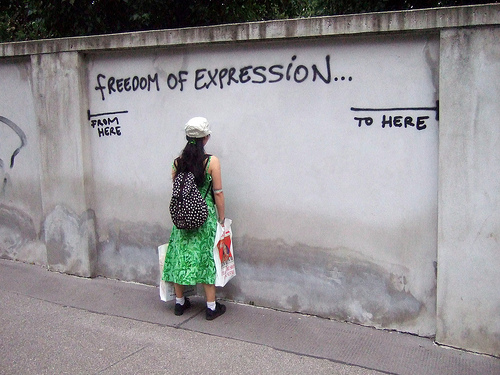I don’t really think of myself as a victim. I feel exceptionally lucky when I think of the life I’ve had so far. I grew up in an upper middle class family, got a fantastic private liberal arts college education, and am now living the American dream with a family of my own, a house, and a good career. And yet, when I read about the ALA Conference Code of Conduct (or, to be precise, the Statement of Appropriate Conduct at ALA Conferences), I started to think back to how many times I have been a victim of things that violate it.
In middle school, I was bullied. In one case that lasted for a year and was very painful, it was about my religion, but there were all sorts of other reasons. In my teens and twenties, I experienced plenty of sexual harassment and unwanted advances including things I’d never mention on this blog. Like most women, I’ve had men yell lewd things from car windows, construction sites and the like. I had a creepy stalker at my first professional social work job. I stopped using instant messaging many years ago because a librarian I’d never actually met professed his love for me and kept contacting me every time I showed up online (did he ever go offline???). Someone at a previous job sexually harassed me and a number of other women and got away with it (a colleague finally reported him, but he simply left for another job at which he probably continued his inappropriate behavior). At an ALA Annual Conference way back when, I was repeatedly sexually propositioned by someone I had respected who invaded my space and made me feel deeply uncomfortable. And that doesn’t include all of the subtle incidents of discrimination, which are far more numerous. Many of my friends in the profession have been through far worse, including things that made their work-lives hell.
And yet, with all that history, I’ll admit that my very first reaction to the ALA Conference Code of Conduct bore more resemblance to a better-informed Will Manley (cached here if it’s still inaccessible) than an Andromeda Yelton. It rankled the non-conformist intellectual-freedom-loving part of me. I’m fairly convinced it’s because of the title. Were it called ALA Policy on Harassment and Discrimination at Conferences, I probably wouldn’t have batted an eye, but Code of Conduct or Statement of Appropriate Conduct just feels very, I hate to say, big brother.
When I think about some of the best talks I’ve been to, the speakers provoked. They cursed. They pissed people off. They made us think. I despise political correctness, maybe a reaction to graduating from the University that was the model for the movie PCU, and believe that people can have respectful discussions without being politically correct. Then again, I don’t think a Code of Conduct is going to make people like Jenica Rogers and Sarah Houghton be any less awesome and provocative in conference talks than they are (if you look, the Code just says to consider how others may perceive what you’re going to say). I hope librarians are not actually going to report other librarians who use the F-word or say something they don’t like (but isn’t discriminatory or harassing), but I know that we all have different sensibilities and different triggers based on our backgrounds. I recently read a post where a blogger argued that a decidedly sophomoric discussion on Facebook about consensual sex at the ALA Conference was consistent with rape culture. When I checked out the link she supplied, I thought it was stupid rather than offensive, but it’s a great example of how people’s freedom to be sex-positive comes into conflict with other people need to feel safe in a space. Same with people’s freedom of speech and people’s more traditional values. I’m pretty sure that the people at ALA Conference Services are smart enough to handle complaints in an intelligent manner, gathering evidence from a variety of people involved to come to a constructive conclusion, but I do hope they’ve had conversations internally about their own planned responses to complaints. Then again, I’m sure they’ve dealt with complaints before this new policy.
I initially thought when I read the Code of Conduct that it won’t really make a difference, because it’s just a policy and no one actually pays attention to those. But then my husband told me about how the online community he manages changed after he instituted a code of conduct. Before the code, there were lots of offensive posts and personal attacks on the site. After the code, things actually changed. And it didn’t actually require much enforcement from moderators. Some people left the site because of it. Others changed their tone. And a lot of new people started contributing. Many women have told my husband that they didn’t feel comfortable in the community before the code of conduct was in place and now they do. It’s really encouraging to hear that a code of conduct can truly change behavior without requiring a lot of actual moderation and punishment.
But in an online community, everything happens in public. Everyone can see the horrible behavior. At ALA conferences, the victim of the harassment will have to report it. And, as Coral Sheldon-Hess describes, it’s easier said than done:
I don’t know if I can convey the feeling of powerlessness that comes from being harassed, or even from unintentional neglect/mistreatment due to (for instance) gender or disability, or from comments people might make about a group they don’t know you’re a member of; I hope that even if you haven’t had these experiences, you will at least believe me that the perceived lack of power in those situations can be completely stifling. When I’ve experienced these kinds of mistreatment, even though there was usually no direct physical threat, I have nonetheless felt very unsafe, totally out on a limb, and completely alone. Looking back, some of my biggest regrets are my failures to respond to those situations, but it is so difficult. Something about having a CoC really helps, because it’s a public, visible statement that the whole organization has your back, and it’s OK to respond, either directly, or by asking for help from someone attached to the event/organization.
I hate how weak I’ve felt every time I’ve been harassed, and how I’ve second guessed whether what the other person did was harassment. I’m very happy that they’ve explicitly provided a way to report harassment in this policy, but I think for this to really be successful there need to be real and visible consequences that makes people believe it’s worth reporting an offender. Otherwise, many people who’ve been victimized will not report it, especially if they have a history of not getting justice. A policy is great, but the organization needs to do more to encourage people to come forward. Again, I’ll reiterate that I hope ALA has internally discussed how they should respond to allegations.
In the end, I think it’s a very good thing that our professional organization is saying that harassment and hate speech are not acceptable at our conferences and giving people a way to report offenders. I understand people’s concerns about intellectual freedom, but I think it’s critically important that we create safe spaces at conferences where everyone feels comfortable attending and participating. Because conferences are better when they encourage the sharing of diverse viewpoints, and people won’t feel safe doing that if certain groups of people feel shamed or silenced. Creating safe spaces, in my opinion, encourages freedom of speech, because it encourages everyone to speak.
At the same time, I’m glad people are bringing up intellectual freedom concerns because it is a cornerstone of our profession and one we should never treat as a minor concern. Truly hearing and responding respectfully to those concerns can only strengthen the arguments for a Code of Conduct (or whatever people want to call it).
Photo credit: Freedom of Expression by Harald Groven on Flickr (cc license: Attribution ShareAlike 2.0)







Definitely agree. With MetaFilter we’ve done pretty good things having a decent and flexible code of conduct and being willing to transparently talk things out with the entire community. People should feel like the organization has their back and there are clearly demarcated lines of what is not acceptable. These lines can be discussed and debated, but making people guess at them just becomes a fertile ground for envelope-pushing harassers. Few people are out and out harasser creeps, but there are a lot of people who like to push whatever boundaries there are, see what they can get away with and try to instill doubt about whether what they are doing is okay (in the mind of the person they are doing it to) Standing up for people’s rights to be free from harassment is a good start. Nicely said.
I think the big takeaway is less about freedom of expression and more about accountability. One of the issues I see as common at events (not necessarily ALA, but I’m sure it happens there, too) is that if someone is offended or feels threatened, the response is often, “I’m sorry YOU feel that way” or “I’m sorry YOU were offended”, which basically puts the onus and responsibility on the the rest of us, as opposed to the person who made the remarks/presentation/body contact etc. If it’s one goal to be thought-provoking at an event (and I’m guilty of that myself), one needs to be able to be accountable for all feedback, not just accolades.
I’ve read some people’s gripes that the CoC wasn’t presented to ALA as a whole to vote on it, Most larger events have this CoC, and I get while the initial reaction might be because of it’s name, but it’s pretty basic boilerplate. And, as your husband points out, just the fact that it exists in a written form can make a difference.
Dan
Your post is characteristically thoughtful and thought-provoking. Thanks as always for your clear view and the voice you use to communicate it. Meanwhile, I think it’s too bad that Manley’s original piece is blocked and the Google cached version can no longer be retrieved.
Thanks for this – it adds some much-needed thoughtfulness & nuance to the discussion.
On the language issue, I am notoriously potty-mothed. My tweets and my FB are filled with the f-word and other NSW language. And I have dropped a few savory words into panel presentations in the past, with a half-hearted apology. BUT — I’m starting to realize that is not cool (for me). I can well imagine that there are people who are uncomfortable listening to a talk littered with foul language, and since the foul language is almost never critical to the point I want to make, I could cut it and maybe make my talk accessible to a few more people.
Note that I am likely to still be pretty salty on Twitter and FB — I see following/friending me there as significantly more voluntary. But I’m going to try to clean it up a bit for presentations and panels — still be as provocative as I can, but with cleaner language. That’s my way of considering the impact of my language on others.
“potty-mothed” should be “potty-mouthed”, obviously.
Hey Chris! I have a major potty mouth in real life, but not in my presentations, though I also don’t have any problem with people having a potty mouth in presentations. I like that we all get to decide for ourselves what to say and how to say it, and I hope everyone does that knowing the possible consequences in terms of how they’re perceived. With every blog post I write, I think a great deal about how what I write might be perceived, but I usually err on the side of “gotta be me” with a small dose of being politic. At different times in my career, that dose of “politic” has been larger and smaller, but I’m always thinking about how I might be perceived. And it sounds like you do the same.
Here’s to all of us finding a healthy balance between being politic (or polite) and being ourselves.
@Jessamyn, I was actually very curious about your take on this as a strong proponent of intellectual freedom and also as someone who manages an online community. Glad to hear we see things similarly. 🙂
@Dan, yes, I think there is that tendency for people not to own their words when someone is offended by them. I’m a big believer in owning our words and actions.
@Roy, thanks! And yes, I noticed just after it was posted that Will Manley had thrown up a robots.txt file that blocked any caching of the site. For people who haven’t seen it (I’m guessing you did, Roy), Manley argued that the Code of Conduct could have a chilling effect on free speech and asked why it was needed at all. The former was a good question (though with a bit of hyperbole), but the latter ignores the reality of so many women in our profession and seemed rather insensitive in my opinion.
Pingback: Creating safe spaces vs. freedom of expression ...
I actually feel like having this in place will make me more likely to be provocative in my presentations. I’ve been in the position before of being harassed after saying things people don’t like. It’s funny how sometimes expressing an unpopular opinion can instantly make you a “bitch” and a “whore”. So I’ve been a bit more restrained than I might have otherwise been, if you cane believe it, thinking of the sometimes out of control reactions.
That’s great to hear, Emily! I hadn’t even thought about the reactions from the audience being constrained (in good ways!) by this.
Pingback: Frankenstein’s Monsters: Roundup of Responses to ALA’s Code of Conduct | Exit, Pursued By A Bear
Pingback: LibTechGender article roundup for January 2014 | Exit, Pursued By A Bear
Pingback: Frankenstein's Monsters: Roundup of Responses to ALA's Code of Conduct | Lisa Rabey
Pingback: LibTechGender article roundup for January 2014 | lisa rabey